2023 Vázquez-Valarezo Poetry Award winners announced
Carly Davis's poem "Seattle Song" won the 24th annual Vázquez-Valarezo Poetry Award at Augustana.
Spotlight on students
New students and this year's graduates
Internship report from Laurence Pavlik
Events and activities
Antiquity in the New Millennium Lecture
Report from Collegia Classica Co-consul Laurence Pavlik
Faculty news
Dr. Day and the Augustana Prison Education Program
• WELCOME to our newest students! So far this year, we have added four new students to our Classics family: Dom Myers-Foster will be a double major in Classical Studies with a Latin emphasis and Accounting; Elia Murillo is a Biology and Art double major with a minor in Classics; and Chemistry majors Fiona Brady and Julian Fielder, Accounting major Kayden Liebscher, and Kinesiology major Magnus Wells are all minoring in Classical Studies with a Latin emphasis. We are glad to have you with us, carissimi!
• This year we bid a fond farewell to three graduating seniors: Kira Banks (Classical Studies with a Greek emphasis, Public Health, and Biology), Morgan Rostamian (Classical Studies with a Latin emphasis and Biology) and Henry Webb (Classics and Physics).
• This year, we inducted two new students into our Epsilon Sigma chapter of Eta Sigma Phi, the National Honor Society for Classics: congratulations to sophomores Iratze Aceves and Charlotte Newport.
• Kira Banks is the 2023 winner of the CAMWS Award for Outstanding Accomplishment in Classical Studies. Εὖγε!
• This year we recognize two students for Best Research by an ΗΣΦ Laureate, Henry Webb for his Senior Inquiry project "The Antikythera Mechanism and the Role of a Model in Early Science" and Jessica Zabala for her SI project entitled "What Makes a Good Doctor? Galen's Commentary and Interpretation of Hippocrates' Epidemics I."
• Kira Banks and Henry Webb have both been chosen for Augustana's chapter of Phi Beta Kappa.
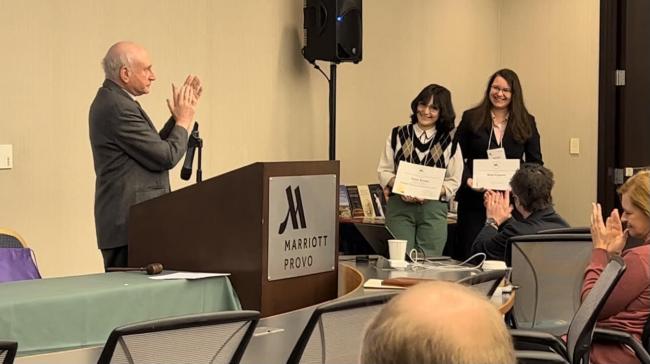
Iratze Aceves (center) receives the Rudolph Masciantonio CAMWS Diversity Award at the annual meeting in Provo, Utah.
• For the second year in a row, the Rudolph Masciantonio CAMWS Diversity Award went to an Augustana student. This year sophomore Iratze Aceves, a Psychology major and Classical Studies and French minor, received a Rudolph Masciantonio undergraduate award, while in 2022, then-junior and triple major in Classics, Biology, and Public Health Kira Banks received the honor. In addition to a $500 prize, Iratze received free travel to and registration for the annual Classics conference in Provo this spring in order to receive her award. We are proud of you both! You can read more about Iratze in this news story.
• This year for the first time, two Augustana students, juniors Allie Anderson (Classics and Political Science double major and Sociology/Anthropology minor) and Laurence Pavlik (Classics and Geology double major), received the CAMWS Manson A. Stewart Undergraduate Award, announced at the annual CAMWS convention in Provo, Utah: congratulations to Allie Anderson and Laurence Pavlik!
• This year too, Laurence Pavlik has been awarded an Eta Sigma Phi H. R. Butts Scholarship for Fieldwork in Classical Archaeology; a 2023 Etruscan Foundation Fieldwork Fellowship; the 2023 Murlo Foundation Director’s Grant; and a grant from Augustana College’s Freistat Center. These awards will facilitate his participation in the Poggio Civitate Field School in Tuscany, Italy, where he’ll be excavating this summer.
Congratulations to all our SUPERSTAR students – we’re proud of you!
• Allan Daly (Classics and Math, 2018) is back in the Midwest working as an Analytic Consultant at Northwestern Medicine in Chicago, Illinois.
• Lirim Neziroski (Ph.D., MBA: Augie graduate ’02, minored in Latin under Dr. Tom Banks) is currently serving as Dean of Humanities, Fine Arts, and Social Sciences at Illinois Valley Community College and lives in the Quad Cities.
Laurence served as an intern for Mammalian Fossils at Chicago’s Field Museum this past summer and shared the following about his experience:
"My job at the Field Museum was to use the 3D scanner to create models of fossilized synapsid skulls. This was to allow Dr. Spencer Hellert, an Augustana Alum, to perform Geometric Morphometric analysis on the fossils and, using that data, track the development of the Mammalian Middle Ear and learn about what pressures influenced the specific development of this region. The Mammalian Middle Ear is composed of four bones: the ectotympanic bone, the mallus, the incus, and the stapes. These bones collect vibrations from the outer ear through the eardrum and conduct them to the cochlea. Within the cochlea these vibrations get converted into nerve impulses so the brain can process it. Those bones started as jaw bones in early tetrapods, and all but the stapes are still part of the jaw of modern reptiles. My background in Classics helped me keep up with the massive amount of background information I had to learn to do this job, as many of the anatomical terms and paleontological names can be broken down into their Greek and Latin roots. Some were easier to understand, such as Lycanops being the wolf-faced Gorgonopsid, or Laminar structures being thin strips of bone for muscular processes to attach to. Others were a bit tricker, like Probainognathians being the animals approaching a modern mammalian jaw structure. Regardless, being able to understand these words as compound words which I already knew parts of made them much easier to remember. A certain level of Roman respect for ancestors also added to the value of holding a 300 million year old Dimetrodon skull and considering how its life may have contributed to mine. I believe Classics and Geology combined have given me a great level of interest in watching a form change based on circumstance and time. Whether declining a Latin noun and then watching it change and develop into a modern English word, seeing a metamorphic rock break and reform as sedimentary than transform into metamorphic, following the origins and alterations of myths from the Classical pantheon, or observing our ancestors shift through the trials of time into our current bodies, I am always studying a form emerge, adapt, and change according to its environment over time."
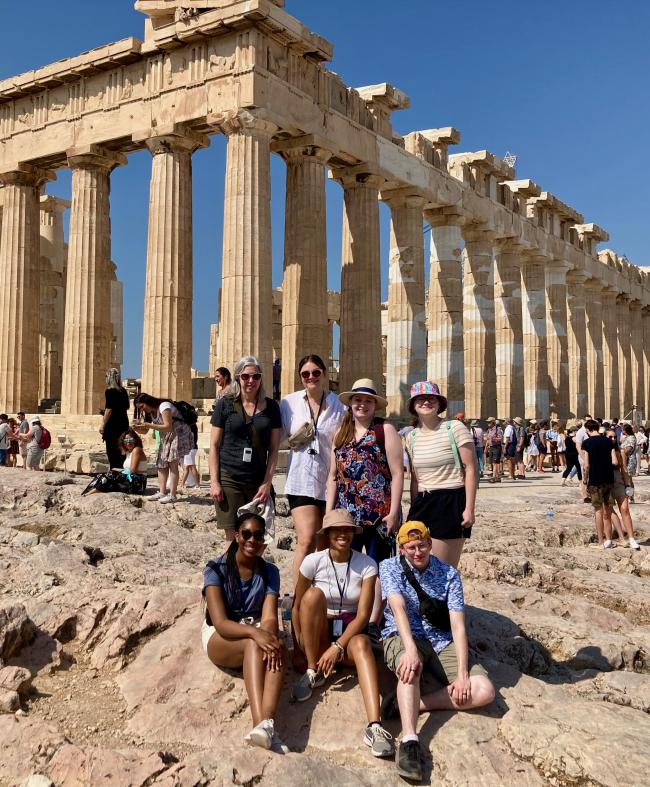
Dr. Kirsten Day with Classics students Jessica Thoresen, Kellis Montgomery, Allie Anderson (back row), Kira Banks, Jameshia Walls, and Ezekiel Aurelius (front row) at the Parthenon in Athens.
After a hiatus in 2020 due to the COVID-19 pandemic, Augustana’s Greece program was back up and running this past summer. Dr. Kirsten Day and co-director Sean Chapman accompanied fourteen students in June 2022 on a trip that started in Athens and then traveled to the Peloponnese, up to Delphi, and then to Crete and the islands. Sites included the Athenian Acropolis and Agora, Mycenae, Epidaurus, Olympia, Delphi, Knossos, Phaistos, Delos, and the Parian marble quarries, with many museums thrown in for good measure. We also visited the working monastery of Hosios Loukas; toured both an olive press and a working winery; stopped at the historic beach at Matala; and participated in Greek dancing lessons.
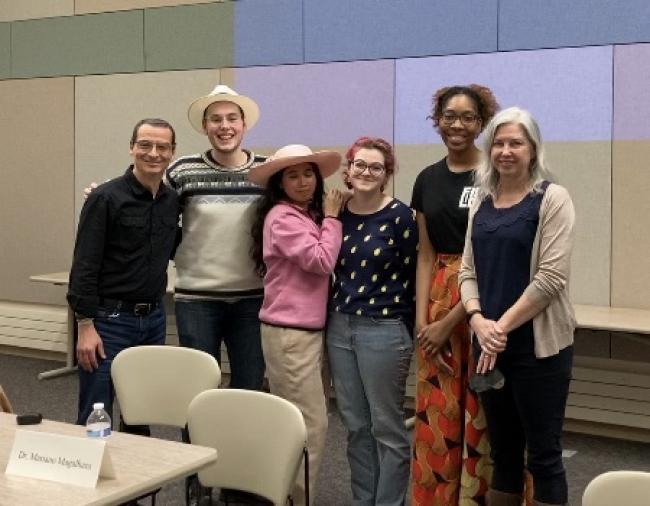
Dr. Mariano Magalhães and students representing the Ecuador program with Allie Anderson, Kira Banks, and Dr. Kirsten Day (at left) at the WACQC “Stories Around the World” event at the Bettendorf Public Library.
Thanks to Kira Banks and Allie Anderson for their help promoting the Greece program as one of Augustana’s study abroad offerings at the World Affairs Council of the Quad Cities’ "Stories from Around the World" event at Iowa’s Bettendorf Public Library in February.
The next run of the Greece program is planned for J-term of 2025, where Dr. Day will partner with Classics’ own Mischa Hooker. This time, we plan to add in a number of late antique and early Christian sites to capitalize on Hooker’s expertise. Stay tuned for developments!
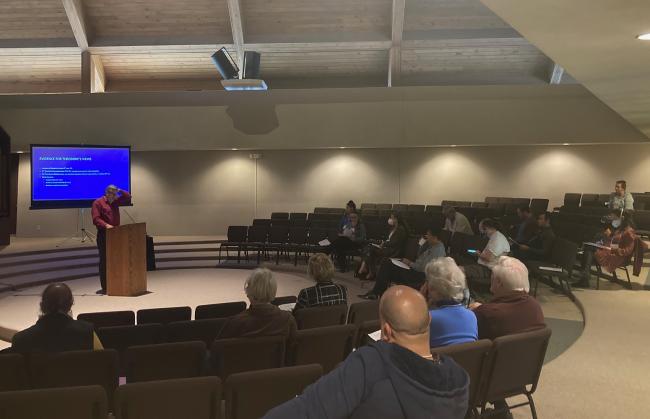
Dr. Mischa Hooker presenting at the Illinois Classical Conference in Rockford, Illinois
In October, Classics faculty and students Iratze Aceves and Laurence Pavlik attended the Illinois Classical Conference in Rockford, Illinois, the first in-person meeting since the onset of the pandemic. At this meeting, Dr. Kirsten Day presented a paper entitled "Reclaiming Classics: Classical Allusions and Racial Equity in HBO’s Watchmen and Lovecraft Country," and Dr. Mischa Hooker presented on "The Book of Job as a Greek Tragedy: Late Antique Interpretive Trajectories."
We were honored this year to have as our Antiquity in the New Millennium lecturer Dr. Shelley Haley. Dr. Haley is the Edward North Chair of Classics and Professor of Africana Studies (Emerita) at Hamilton College and past president of the Society for Classical Studies. An expert on Black feminist thought, Dr. Haley gave a virtual lecture entitled "What’s a Black Feminist Like Me Doing in a Field Like This?!" on Thursday, November 10th. (Dr. Haley is also an expert on Cleopatra, and you can catch her now on Netflix’s Queen Cleopatra documentary: check it out!)
We are pleased to announce that the speaker for next year’s Antiquity in the New Millennium Lecture will be Dr. Patrice Rankine, Professor of Classics at the University of Chicago. Dr. Rankine will be speaking on slavery, masses, and the elite in Herodotus on Tuesday, March 12, 2024 at 4:30 p.m.: plans are still developing, but please save the date!
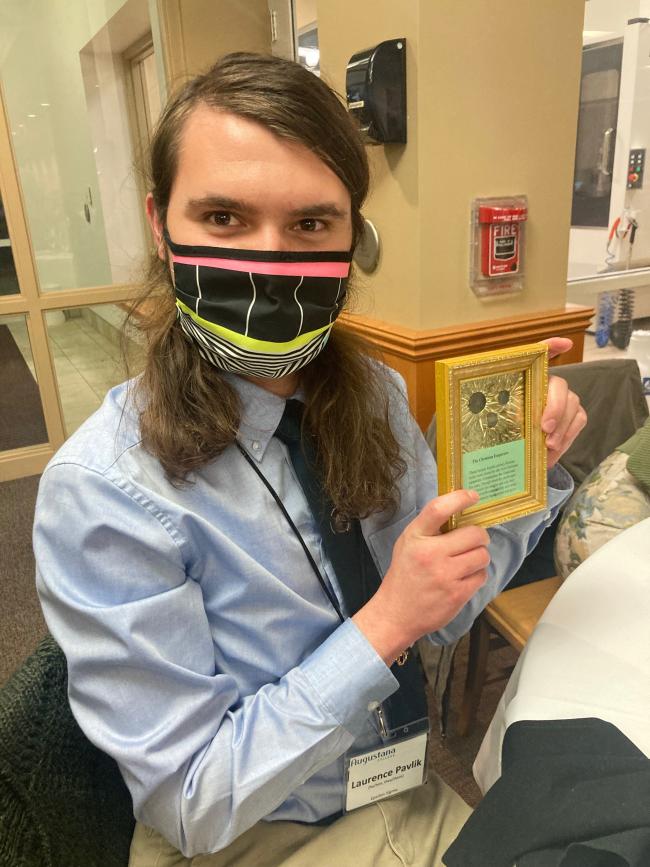
Laurence Pavlik wins Honorable Mention for his paper "De Deis Naturae" at the 2023 Eta Sigma Phi convention in Monmouth, Illinois.
This March, Dr. Kirsten Day accompanied students Iratze Aceves and Laurence Pavlik to the Eta Sigma Phi annual convention in Monmouth, Illinois. Laurence immersed himself in the events, participating in the Certamen and the Greek Declamation Contest, and earning Honorable Mention for the presentation of his paper "De Deis Naturae" (written under the directorship of Dr. Mischa Hooker). In addition, Laurence was elected Megale Prytanis of the National Eta Sigma Phi organization – a first for an Augustana Classics student! Congratulations, Laurence!
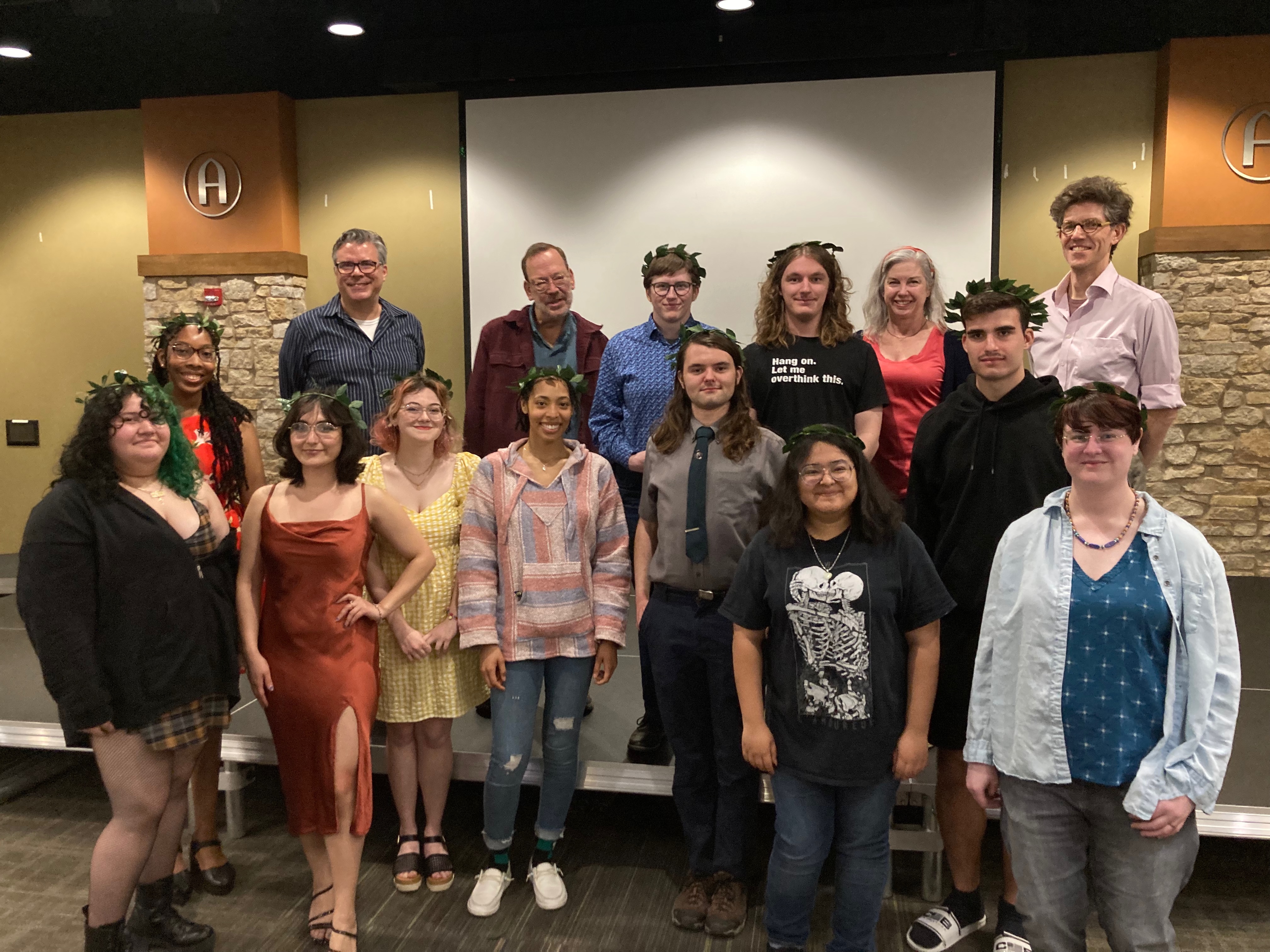
Classics faculty, students, alumni, and prospective students at the 2023 Classics banquet. Back row: Dr. Mischa Hooker, Dr. Emil Kramer, Ezekiel Aurelius, Henry Webb, Dr. Kirsten Day, and Dr. Nick Dobson. Front row: Elia Murillo, Kira Banks, Iratze Aceves, Allie Anderson, Jameshia Walls, Laurence Pavlik, Jessica Zabala, Daniele Meloni, and Katie Rea.
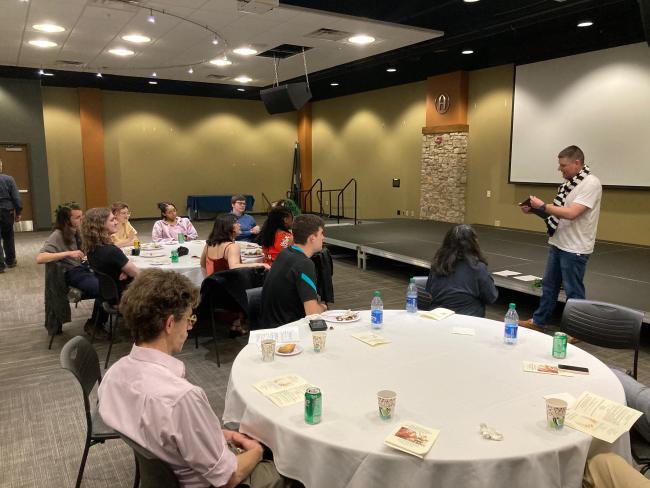
Estlin Feigley of Fresh Films offers a presentation on how Classics has informed his life and his work at the 2023 Classics banquet.
Our annual Classics banquet was held in April, as usual, to coincide with Rome’s birthday. We once again had a lavish Mediterranean feast, inducted our new members of Eta Sigma Phi and lauded our honorees, before hearing a talk from alumnus Estlin Feigley (’93: Classics and Theater), founder of the production company Fresh Films. In addition to our current majors, minors, prospective students, and faculty, we were happy to welcome back Professor Emeritus Emil Kramer and alumni Katie Rea (’14), Ezekiel Aurelius (’22), and Jameshia Walls (’22).
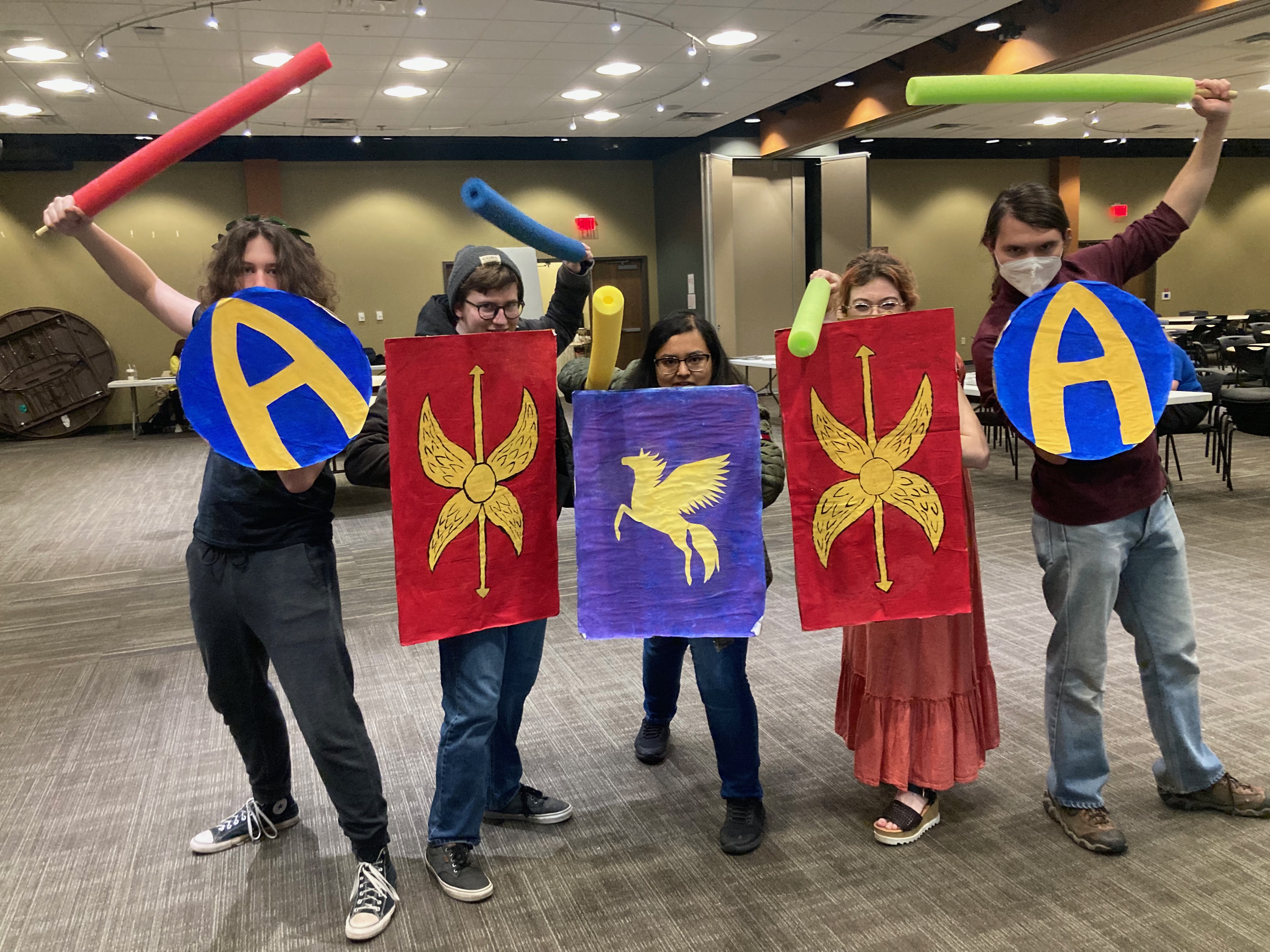
Students and attendees at the 2023 Language Olympics after learning about ancient armor and fighting techniques. From left: Harper Chapman, Ezekiel Aurelius, Jessica Zabala, Allie Anderson, and Laurence Pavlik.
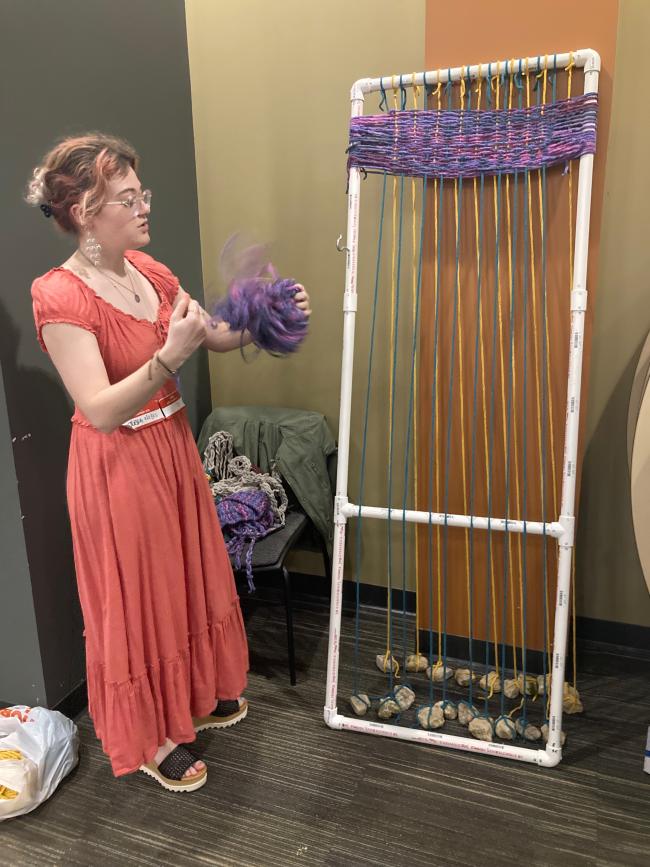
Allie Anderson offers a demonstration on ancient weaving at the 2023 Language Olympics event.
"Collegia Classica had two movie nights this year, one each semester. In November we watched Hadestown, joined by alumnus Ezekiel Aurelius. In spring we watched Spartacus, with several students from Dr. Hooker's Roman history class in attendance.
This year’s big event was the Language Olympics, where we featured samples of ancient foods, ancient writing demonstrations, a weaving demonstration, and interactive mini-lessons on ancient weaponry and combat techniques. We were joined by the Vietnamese student association and the French Club.
We also had our classics banquet, and two end of term dinners at our traditional venue, Trattoria Tiramisu in Bettendorf."
Thanks to this year’s Collegia Classica officers: Laurence Pavlik (Prytanis/Co-Consul); Iratze Aceves (Hyparchos/Co-Consul); Henry Webb and Paige Meyer (Grammateus/Secretary); and Jessica Zabala Chrysophylax/Treasurer).
Classics students and faculty at Trattoria Tiramisu in Bettendorf. Back row: Allie Anderson and Laurence Pavlik. Front row: Dr. Kirsten Day, Dr. Nick Dobson, Jessica Zabala, Dr. Mischa Hooker, Iratze Aceves, Kira Banks, and Henry Webb.
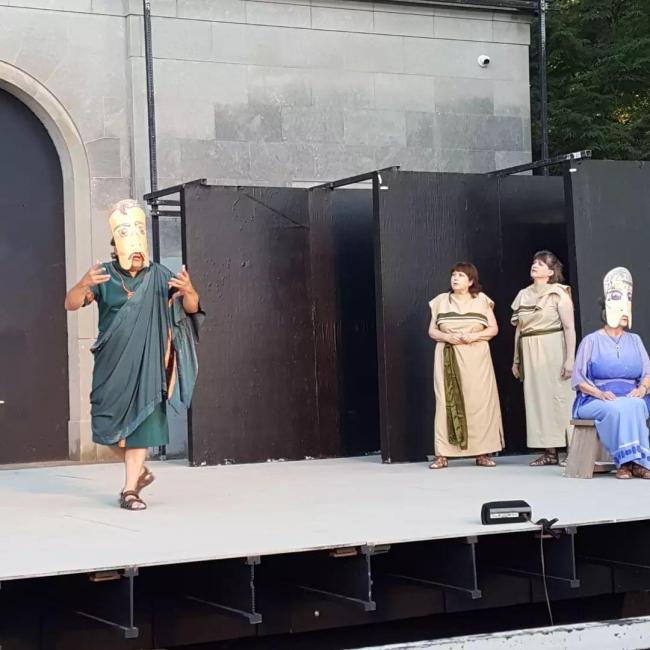
Dr. Mischa Hooker (left) as "Old Man" in the Genesius Guild’s summer production of Sophocles’ Electra. Photo by Anna Tunnicliff.
As many of you know, Dr. Mischa Hooker has long been involved in the local theater scene. This past summer, he once again participated in the Genesius Guild's productions in Lincoln Park’s outdoor theater, being cast in Sophocles’ Electra. Dr. Hooker played the part of the "Old Man" who returns to Argos with Orestes in order to help further his revenge plot against Clytemnestra and Aegisthus. The Old Man's hour of glory came when he described for Clytemnestra in elaborate, emotional, and gruesome detail the chariot accident in which (he says) Orestes has died — but it's all a lie! Dr. Hooker also played Antipho in the Committee for Ancient and Modern Performance (CAMP) production of Terence’s Phormio at the Society for Classical Studies annual meeting in New Orleans in January.
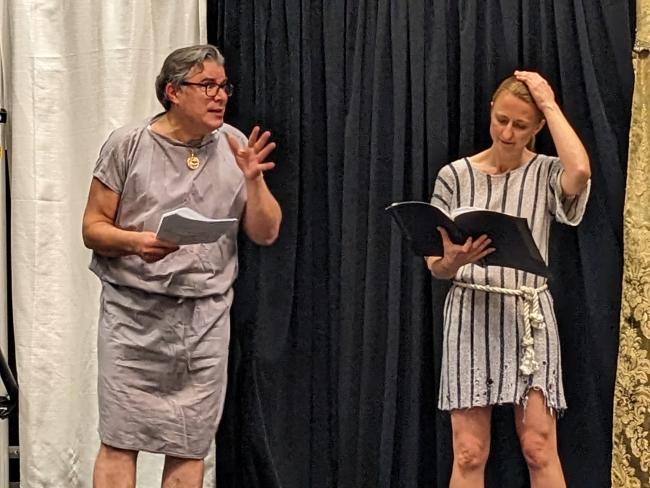
Dr. Mischa Hooker (left) as Antipho and Teresa Danze as Geta in the CAMP production of Terence’s Phormio in New Orleans. Photo by Suzi Elnaggar.
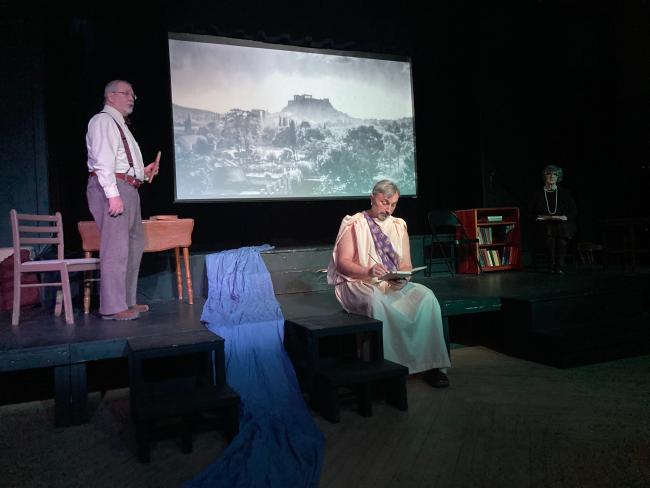
Michael Carron as Floyd Dell, Dave Bonde as Jig Cook, and Dee Canfield as Susan Glaspell in a scene from “An Iowa Seer Comes Home to Greece,” from the New Athens Players’ Spotlight on Susan Glaspell performance.
In addition, this spring, Dr. Hooker introduced a new local production company: the New Athens Players. Their inaugural production, with six performances at the Village Theater in the Village of East Davenport in February and March of this year, was Spotlight on Susan Glaspell, which included three short pieces drawn from the life and work of this ground-breaking and award-winning early 20th century Davenport writer. In “Rules of the Institution,” Hooker adapted Glaspell’s short story of the same name into a short play; in “An Iowa Seer Comes Home to Greece,” Hooker drew on excerpts from Glaspell’s “Last Days in Greece,” fellow writer Floyd Dell’s “A Seer in Iowa,” and George Cram Cook’s poems “Thought Stone Be Broken” and “At Fifty I Ask God” to create a biographical portrait of Cook, who was Glaspell’s husband and co-founder with her of the Provincetown Players. The performance culminated with a performance of Glaspell’s most famous play, “Trifles.” Through his New Athens Players – whose name is inspired by Glaspell’s creativity and accomplishments – Hooker helped to celebrate her legacy, highlight the work of this Quad Cities native, and bring a taste of Greece to our local community. You can read more (and check out the excellent reviews) in the River Cities’ Reader and at OurQuadCities.com. Be on the lookout for more performances from this exciting new theater troupe!
Last fall, Dr. Kirsten Day taught a course on Greek Warrior Myths and Combat Trauma at the East Moline Correctional Center as part of Augustana’s Prison Education Program (APEP). The APEP program offers incarcerated individuals a chance to earn a bachelor’s degree in Communication Studies or American Studies, giving them skills that will better prepare them to return to their communities as productive members of society and reducing recidivism. “The men in the class were all enthusiastic participants, and most were eager to continue studying classical literature, so they seemed to find it very rewarding. But this experience was enormously useful for me as well. It has changed the way I view my discipline, my job, my teaching, and society more broadly,” Day says. “I taught the same course on our main campus during J-term, and the class benefited enormously from the unit on using Greek myths to process trauma related to incarceration that the men in my APEP class helped to develop.” A virtual visit to her J-term course for the “Prometheus in Prison Unit'' by Brandon Martinez, a formerly incarcerated man who has worked closely with APEP, and a talk in April by former APEP student David Staples for her spring term course on Classical epic have helped to drive home to traditional students on the main campus the continuing relevance of Classical narratives and how they can serve not just to help those in extreme circumstances process trauma, but also give those on the outside better insight into the perspectives of those with different life experiences.
Day participated in a roundtable discussion (“Classics and the Incarcerated”) with other Classicists who have experience teaching in prison contexts at the Antiquity in Media Studies virtual conference in December of 2022, and offered a talk on her experiences teaching in prison at the Illinois Junior Classical League meeting in Itasca, Illinois in February 2023. She will be teaching Classical Mythology with APEP in fall of 2023, and is looking forward to teaching Latin with the program in the near future.
We would like to offer our sincere thanks this year to Carla Arnell and Paul Lucas and to Drs. David and Anne Johnson for their generous gifts to the Classics Department.
And as always, we would like to acknowledge the Harry S.B. Johnson Endowment and the Terence Fund for Classics, which provide the continuing support that helps keep our program robust. The H.S.B. Johnson Endowment was established by family and friends in honor of Harry S.B. Johnson, who was Dean of Men and Professor of Greek at Augustana from 1942-1964. The Terence Fund for Classics was established by former Augustana professor of Classics Jane Borelli. The support of donors like these help make the events and initiatives highlighted in this newsletter possible. Multas gratias!
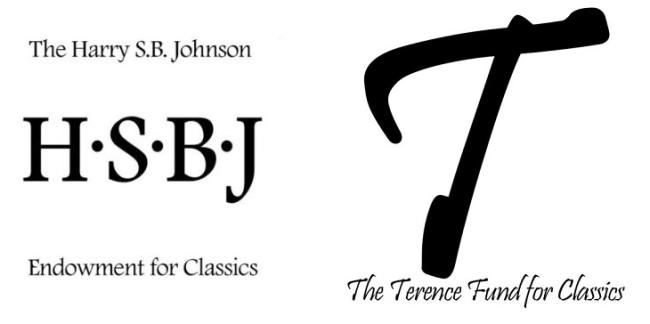
Carly Davis's poem "Seattle Song" won the 24th annual Vázquez-Valarezo Poetry Award at Augustana.
Kaitlin Jacobson's poem "crooked smile"” won the 23rd annual Vázquez-Valarezo Poetry Award at Augustana.
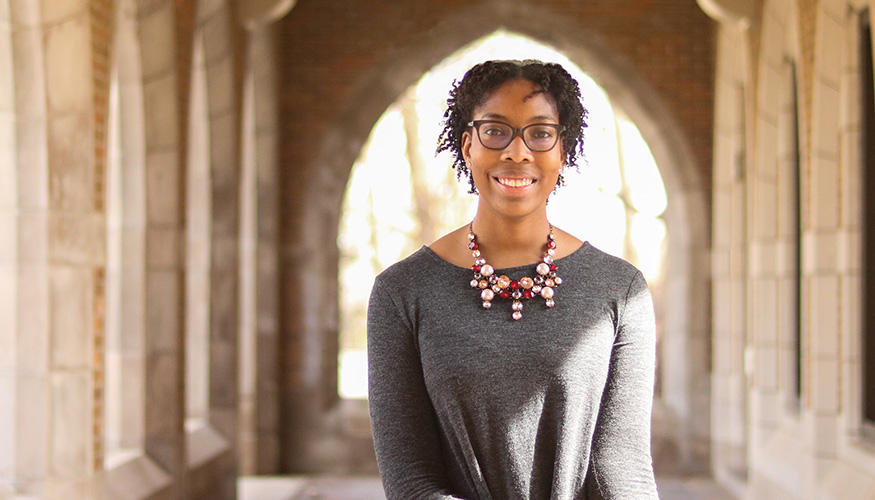
Kira Banks '23 came to Augustana to study biology and public health and, as often happens at a liberal arts school, discovered a passion for a seemingly unrelated major — Classics. Read about her recent award.
Dr. Robert Holschuh Simmons, Associate Professor and Chair of Classics at Monmouth College, will present a lecture entitled "Demagogues and Masses in Athens and the Athenian Theatre: Class Anxiety and Apprehensions About Insurgencies in Euripides’ Tragedies."